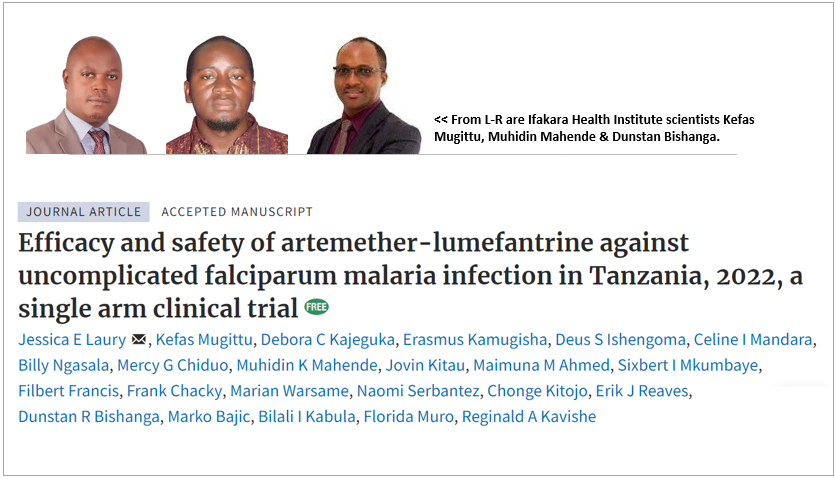
CONFIRMED: Tanzania’s first-line malaria drug remains effective

A recent study conducted in Tanzania in 2022 has confirmed that the malaria drug known as artemether-lumefantrine (AL), the country’s first-line treatment for uncomplicated malaria, continues to be highly efficient in most regions.
In 2006, Tanzania adopted AL as the first line of treatment for malaria. AL is one of six artemisinin-based combination therapies (ACTs) recommended by the WHO for the treatment of uncomplicated malaria. While AL is the sole first-line therapeutic for malaria infection in Tanzania, Artesunate-amodiaquine (ASAQ) and dihydroartemisinin-piperaquine (DP) are the current second-line drugs.
The study, published in the PLOS One journal, was led by scientists from academic and research institutions in the US, Tanzania, and Sweden, with contributions from Ifakara Health Institute scientists Kefas Mugittu, Muhidin Mahende, and Dunstan Bishanga, who are part of the Shinda (Defeat) Malaria program.
Hundreds of children monitored across four Tanzanian regions
A total of 352 children aged 6 months to 10 years were involved in the study which was conducted across four sites in Morogoro, Pwani, Kigoma, and Tanga. Each participant received a standard 3-day regimen of AL, and their health was monitored for 28 days using the standard WHO protocols. Scientists also used special tests to determine whether malaria reoccurred due to new infections or if there was relapses of the original infection.
High efficacy rates reported in most regions
The results were largely positive, showing efficacy rates of 98.9% in Morogoro, 95.0% in Kigoma, and 94.4% in Tanga. However, in Pwani, the drug's effectiveness was 89.9%, just below the WHO’s recommended 90% mark. This is a concern because according to WHO guidelines, when a drug’s effectiveness drops below 90%, a review of the national malaria treatment policy is recommended. On a positive note, no signs of drug resistance were found in any of the regions studied.
Scientists call for routine monitoring, policy updates
“The early detection of this resistance supports the need for routine therapeutic efficacy monitoring in accordance with WHO guidelines to efficiently identify and respond to emergent antimalarial drug resistance and suggests a change in antimalarial may be warranted in some regions of Tanzania to slow the spread of antimalarial drug resistance,” the scientists noted.
Despite the reduced efficacy in Pwani, AL remains a highly effective malaria treatment in most regions. The study underscored the need for further investigation and consideration of alternative antimalarial treatments to maintain effective malaria management across Tanzania.
“Artemether-lumefantrine remains highly efficacious in three regions of Tanzania but the PCR-corrected efficacy in Pwani fell below the WHO-defined 90% threshold at which policy change is recommended. Implementing strategies to diversify ACTs to ensure effective case management in Tanzania is critical,” recommended the scientists.
Regular monitoring is key to managing malaria
As malaria remains a serious public health concern, particularly among young children, keeping it under control is very important. The WHO recommends regular monitoring of drug efficacy to inform case management policy decisions which is essential in ensuring Tanzania stays ahead of emerging challenges and protects its population from the disease.
Read the publication here.
